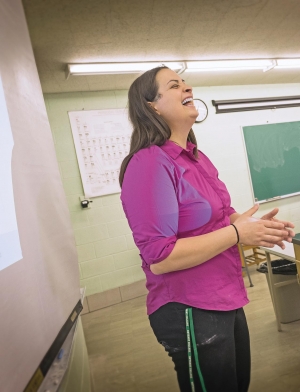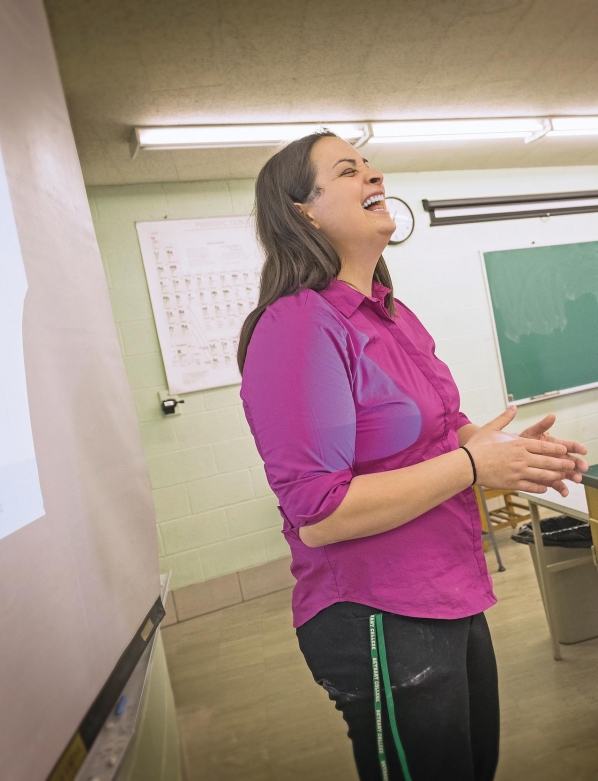CAROLYN KITCHENS has a humble approach to help students “get” science.
By: The Bethany Today, Spring 2017 issue - Faculty Profile - Appalachian State Alumni
“THEY SAY THAT TEACHERS breed teachers,” laughs Carolyn Kitchens, Ph.D., assistant professor of chemistry. Even so, one can’t really characterize her path to the profession of teach-ing—and specifically, teaching at Bethany—as a direct one. She saw her future firmly in the field of medicine.
Appalachian State University might have seemed like a logical choice for Dr. Kitchens’s undergradu-ate career, since her parents both taught in the math department there. It was her dream to play basketball at the college level that ultimately drew her there, however.
While making a name for herself on the court during her freshman and sophomore years, she also settled into coursework, concentrating on a Bachelor of Science degree in chem-istry, a minor in biology, and a pre-med focus. Her ultimate goal was to become a doctor, until she spent the summer between her junior and senior years at the National Institute of Standards and Technology in Gaithersburg, Maryland, participat-ing in a SURF (summer undergradu-ate research fellowship) program. It was at that point she discovered her love of research.
Ultimately, that summer would shift her focus away from an MD degree, and she instead enrolled at the University of Pittsburgh to pursue an interdisciplinary graduate degree in research within the Department of Pharmacology and Chemical Biology.
She had planned to go to school much closer to home. But when she interviewed, “It was by far the best program that I interviewed with. The biggest difference was that it was more of a family environment, like Bethany. As soon as you were there, they were going to do everything in their power to help you succeed. It was one of the best decisions I’ve made in my life.”
But even at this juncture, she was interested in exploring opportunities to hone her teaching skills. During the second semester of her first year, she presented an idea to the head of her program. “I suggested having second-, third-, fourth- and fifth-year students act as teaching assistants (TAs) for that first semester of classes. It made sense for a couple of reasons: one, you mentor students; two, you get tutor-ing help. It was a whole different way of thinking for the upper students. You aren’t just memorizing and regur-gitating information. Now, you’re applying it. Typically, making that shift is the hardest transition from undergraduate to graduate school. And they went with my idea and they developed a whole new TA program that’s been very successful.”
Her enjoyment of the field led to her Ph.D. in molecular pharmacology. After completing her coursework, she embarked on two postdoctoral research opportunities. However, during the first, she had an accident that would lead her away from the field of research permanently.
Halfway through the assignment, she broke her back playing ice hockey and had to have surgery to repair the damage. “After that, transitioning back into research was extremely dif-ficult: having to stand, working at a computer all day, working at the lab bench, and always bending at the waist. Fresh out of spinal surgery, it was really difficult for me to do my research with constant pain. And when you’re in pain, you can’t focus.”
It was at this point her thoughts turned back to a career in education. “Teaching was always in the back of my mind. It was always there. For me, it’s not about money. It’s about what makes you happy. And at that point, my research wasn’t making me happy. And that’s what transitioned me. I feel like it got me back on my correct path.”
Her next postdoc was set to last for six months, and would have a teaching component. During the assignment, she conducted research during the day, and taught anatomy and physiolo-gy to nursing students at a local com-munity college at night. It proved to be a valuable time because she was stuck in a classic conundrum: How does one obtain a teaching position without experience, and how does one come by experience without a position?
At the end of the six months, she decided to pursue teaching. She began by reaching out to former mentors via e-mail, and was prepared to wait until a position opened up.
It would seem that fate took the opportunity to step in and assist. One of her advisers at Pitt also received an e-mail from Lisa Reilly, The Goulding-Woolery Professorship in Chemistry, associate professor of chemistry, and chair of the Department of Physical and Computational Sciences at Bethany, looking for someone to teach organic chemistry and biochemistry in an adjunct position. “He said he lit-erally got our e-mails at the same time.” Two days later, Kitchens drove down to Bethany to interview, and they offered her a position. After a stint as a visiting professor, Kitchens was offered a tenure track position. She sold her house in Pittsburgh and now calls Bethany home.
Adjusting to Bethany was easy, as she found the area to be similar to where she grew up on a farm in Boone, North Carolina. “I love the country life, but I love the city life as well,” she explains, and she finds the small village of Bethany, with its close proximity to towns and cities, the perfect balance.
Currently, Kitchens teaches Organic Chemistry, Biochemistry, Medical Terminology, Intro to Pharmacology, Consumer Chemistry, and Chemistry for Non-science Majors. In 2016, she’ll also take her turn at teaching a freshman seminar.
When asked about her teaching style, and how she engages the reluc-tant learner, she offers some insight. “I don’t think of myself above any-body in the classroom. I just have more knowledge about the field than the students do. I try to have a hum-ble approach. I make a lot of corny jokes. A lot of puns. I have no problem humiliating myself for the enjoyment of the students,” she laughs.
Her mother especially influenced her to think in terms of working with each student to determine different learning styles. “Everybody can be good at chemistry. I play off the idea that, if I explain something to you, and you don’t get it, maybe I try that way one more time. If you still don’t get it, I know I’m not explaining it in a way your brain can comprehend. This is my biggest challenge in teaching: trying to find that way—how can I explain.”
She finds that Bethany’s small class size is especially valuable when it comes to her ability to check for learn-ing among her students. “If I had a class with 100-plus students, there’s no way I could do that. That’s where the Bethany education is ideal. I do have those chances. By the end of the semes-ter, I know every student by name.”
However, she does expect students to do their part. After all, this is a partnership. “Toward the beginning of the semester, I reach out, but then it’s also on the student to reach out to me as well.”
Helping chemistry to click with the student who has never gotten it is one of the most exciting parts of Kitchens’s job. However, she also appreciates the inherent beauty and order in the study of biochemistry.
“It’s the passion of the study, but also it’s the beauty of biochemistry. All of life—not just humans, all life—comes from just six elements. Just the beauty and order of that is mind-blowing. It’s just that mind-boggling question of how, and I think everyone deserves the right to know and explore the ‘how.’”
But connecting with students and building relationships is something Kitchens enjoys doing outside of the classroom as well. Since she came to Bethany, she’s taken on other cam-pus roles.
In addition to her role as professor, she also serves as the adviser for stu-dents on the health sciences track. One big part of that job is acting as the adviser for Pre-health Club, a student-run club for anyone interested in pur-suing a career in health sciences. Originally, the club mostly attracted students interested in going to med-ical school, but now it has grown to welcome anyone seeking a career spanning the health sciences.
Kitchens sees this as an opportuni-ty to open up career pathways to stu-dents who might want to take a differ-ent track to practicing medicine rather than becoming a doctor.
“We’ve really had a push to help stu-dents realize there’s more to the health sciences field than just medical school. There are other options and paths you can take that are still in the health profession,” she says.
But the opportunity to grow rela-tionships with students outside of the classroom and lab is something Kitchens values as well. Since coming to Bethany, she’s taken on additional roles as faculty adviser to the sisters of Phi Mu, and she also assists in coach-ing the Men’s and Women’s Track & Field teams in her specialty, javelin.
“In terms of the things I’ve done at Bethany, becoming faculty adviser for Phi Mu was one of the best decisions I made,” adding that she’s built many friendships as the result of the work with the chapter.
The opportunity to coach was influenced by a student as well, when one of her students asked her to give him some advice on how to throw the weight for an indoor track and field competition. Sharing a few tips led to an opportunity to assist in coaching the team, and Kitchens is proud that the men have now brought the PAC Indoor Track & Field Championship title home two years in a row.
For Kitchens, the opportunities to teach in a field she loves, to advise students charting a course for the health sciences, and to lead in other roles on campus have all led her to believe that she is right where she is meant to be. Validation of her per-spective came from someone who originally encouraged her to steer clear of teaching: her mother.
In 2015, Kitchens took four of her upper-level pre-health students for a spring break course in Ft. Myers, Florida. After the group completed some community service, they round-ed out the visit with some kayaking on Tampa Bay. Kitchens’s mom and brother joined them.
“After that trip, my mom came up to me, and she was in tears. ‘You are exactly where you’re meant to be,’ she said. ‘I’ve put everything into teach-ing, and I have never had a student look at me the way those students looked at you today.’ I tear up think-ing about it. And that’s the Bethany experience: the respect and the friendship that’s there between stu- dent and adviser.”
To see the original article, visit the Bethany Today, Spring 2017 issue at http://www.bethanywv.edu/alumni/alumni-news/ under Faculty Profile by Bethany College in Bethany, West Virginia http://www.bethanywv.edu/.

